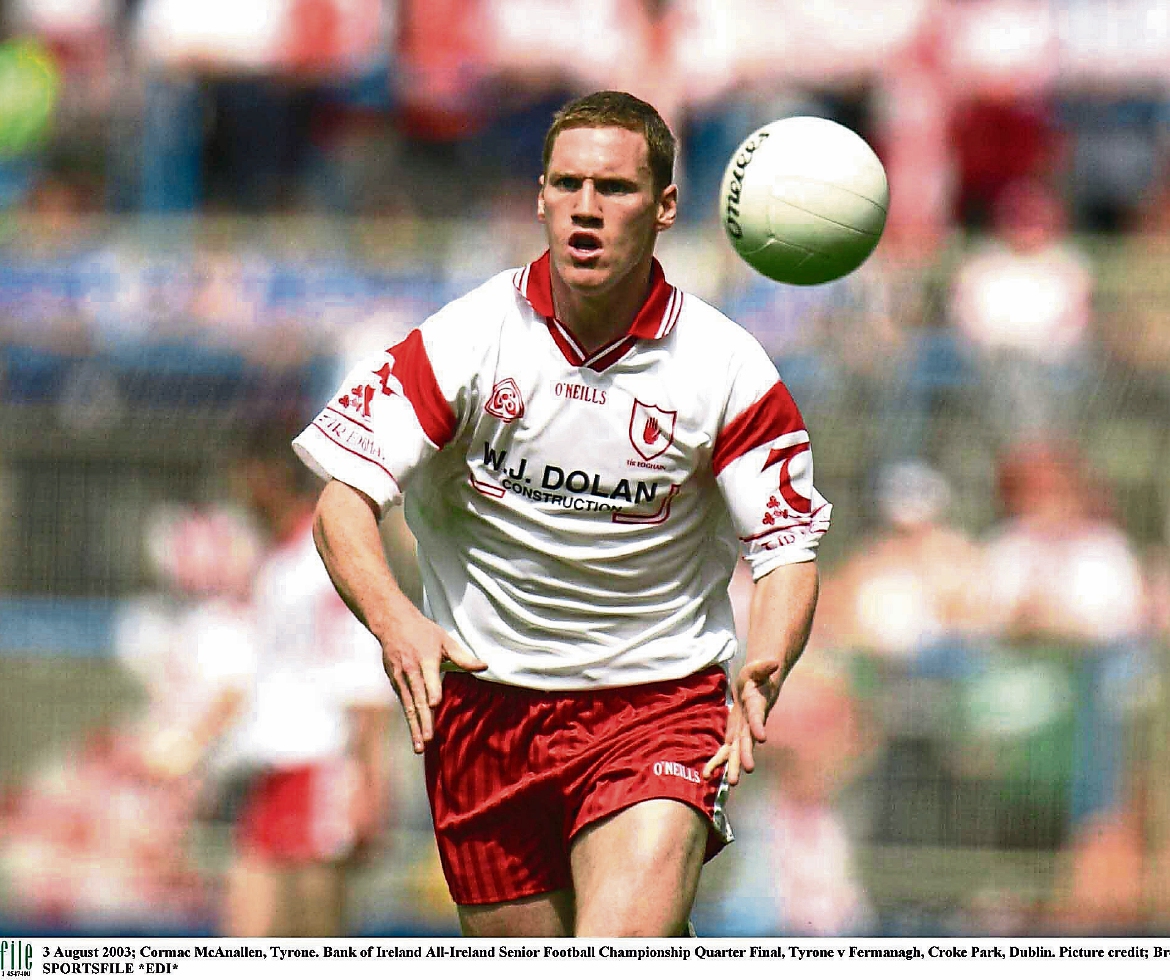THE McAnallen home near Eglish changed forever on the morning of March 2, 2004. Tyrone GAA captain, Cormac, had died in his sleep during the night aged just 24.
His shocking death plunged his family into mourning, along with his parish community, the county he served so well in sport, all lovers of gaelic games and so many others who only learned to know him in death and recognise the huge legacy he left behind from his too few years.
An inspirational leader on the pitch and a young teacher in the classroom, Cormac achieved more in his 24 years than many could hope for in a lifetime.
In weeks and months afterwards, the McAnallen family – Cormac’s father, Brendan, his mother, Bridget, and brothers Dónal and Fergus – struggled to come to terms with his untimely passing.
It emerged that Cormac had died from sudden adult death syndrome, news that came as a “great shock” to his mother.
“We quickly realised that we had to raise awareness of this condition,” Bridget McAnallen said.
“That in itself really helped to alleviate our own sense of hopelessness and grief.
“It was actually a source of comfort to know that we could possibly help prevent other young people from dying from a cardiac event.”
The family established the Cormac Trust, dedicated to raising awareness of sudden cardiac death.
Over the past two decades, the Trust embarked on a tireless mission to promote cardiac awareness and facilitate life-saving interventions. From advocating for widespread defibrillator deployment to championing cardiac screenings, their endeavors have reshaped the landscape of cardiac care in Ireland.
“So many people have contacted us to say that they have been saved by a defibrillator, or that the screening which they attended has helped identify a problem that has been subsequently addressed,” said Bridget,
“There was so little awareness of sudden cardiac death in 2004,” she continued. “So I think that through the Trust, Cormac has created a great legacy in that respect.
“It’s impossible to say how many lives have been saved since we started, but at least we are now much more aware of these heart conditions than we were 20 years ago.”
As a young footballer, Cormac had achieved everything possible in the game.
He first came to prominence in 1997 as a member of the Tyrone minor team which lost the All-Ireland final to Laois. That campaign, however, was overshadowed by the tragic death of another talented Tyrone player Paul McGirr, who was a good friend of Cormac’s.
Under Cormac’s captaincy, Tyrone returned in 1998 to capture the All-Ireland minor title, exacting revenge on Laois in the process. Two years later and with McAnallen again as captain, the Red Hands landed the All-Ireland u-21 title at Limerick’s expense. The brilliant midfielder was also to the fore when Tyrone retained their u-21 crown in 2001.
He also won an Ulster senior medal in 2001 and was honoured with the Vodafone Young Player of the Year award.
During the early stages of 2003’s historic All-Ireland campaign, Tyrone experienced major difficulties at full-back and Mickey Harte immediately turned to Cormac to fill the troublesome position. The Eglish clubman proved such a success in his new position that he was named at full-back on the All-Star team.
Cormac also represented Ireland in the past two International Rules series against Australia and represented both Queen’s University and UCD in the Sigerson Cup.
Those memories are now extremely precious to Bridget, who also reflects upon Cormac’s many qualities as a “friendly, kind and decent person.”
“Cormac had such great ability, and yet he was very humble,” she said.
“He didn’t show-off, he was just easy to get on with, enjoyed having fun and being a friend to everyone.
“Yes, he had a lot of responsibilities but Cormac was able to enjoy life a lot even though there was a lot of pressure on him.
“He could balance things very well and really we have nothing but good memories of a very joyful young person.”
Cormac was a member of the teaching staff at St Catherine’s, Armagh and had been in a steady relationship at the time of his death.
“I know he was hoping to get married and have children at some stage,” said Bridget.
“He was also popular at school and was a very good teacher, so I think he would have had a very successful career in that field as well.
“But, while we will never know exactly what Cormac would have gone on to achieve, we do know that he had already achieved so much and was very successful in many ways.”
Last weekend, it was announced that the Cormac Trust was being wound-down after 20 years.
However, as its work comes to an end, Bridget still believes that there is much to do in raising awareness about heart conditions such as the one which claimed the life of her son.
“Over the years, we have had so many talks and discussions with support groups, community organisations and individuals who have lost members of their family to a heart condition.
“But I’m not sure the message is still getting out to the public,” Bridget adds, “And I think the health service can do much more.
“For example, there still isn’t any NHS public awareness campaigns, but I feel that as a charity we have done all that we could.”
This weekend the McAnallen family and the community of Eglish will mark the 20th anniversary of Cormac’s death.
They will remember a beloved son, brother, and sporting icon whose legacy continues to inspire.
Receive quality journalism wherever you are, on any device. Keep up to date from the comfort of your own home with a digital subscription.
Any time | Any place | Anywhere












